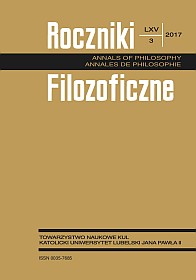Reason as the Faculty of Thinking in the Service of the Will, Will as the Faculty of Making Choices according to the Judgement of Reason: Controversies about Subject, Cause and Conditions of Human Freedom in the Twelfth Century Anthropology
Abstract
A starting point of this paper is a consideration and confrontation of the various meanings of the term “will” formulated and discussed in twelfth century anthropology. A significant part of this historical research is devoted to such issues as the characteristics and specific activity of the human will, its relation to the whole domain of the desire, particularly that of the sensual desire, and especially the mutual—functional and hierarchical—relationship between will and reason as the cognitive faculty. On the ground of the critical and comparative analysis of the text-sources (including the works of Anselm of Canterbury, Bernard of Clairvaux, Hugh of Saint-Victor, as well as the collections of sentences of known and unknown authors), author of the paper explores the views of just mentionnned and other thinkers of this time on the belonging of the will to the domain of human rationality, on the participation of the intellect in the will’s decisions and choices, one the one hand, and on will’s autonomy and its possibility of self-moving, on the other. He focuses his scrutiny on how the twelfth century thinkers try to explicate a phenomenon of free choice or free decision and to answer to a questions concerning a proper subject, source, efficient cause or necessary and sufficient condition of the human freedom in the context of the medieval disputes between voluntarism and intellectualism in the domain of anthropology.
References
Boquet, Damien. „Le libre arbitre comme image de Dieu: l’anthropologie volontariste de Bernard de Clairvaux”. Collectanea Cisterciensia 65 (2003): 179–192.
Colish, Marcia L. Peter Lombard. Vol. 1. Leiden, New York, Köln: Brill, 1994.
Colish, Marcia L. „Another look at the School of Laon”. Archives d’histoire doctrinale et littéraire du Moyen Âge 53 (1986): 7–22.
Flint, Valerie. „The School of Laon: A Reconsideration”. Recherches de théologie ancienne et médiévale 43 (1976): 89–110.
Kent, Bonnie. Virtues of the Will: The Transformation of Ethics in the Late Thirteenth Century. Washington, D.C.: The Catholic University of America Press, 1995.
Landgraf, Artur M. Écrits théologiques de l’école d’Abelard. Spicilegium Sacrum Lovaniense, fasc. 14. Louvain: Université Catholique, 1934.
Lottin, Odon. La théorie du libre arbitre depuis S. Anselme jusqu’à S. Thomas d’Aquin. Saint Maximin, Louvain: Abbaye du Mont-César, 1929.
Lottin, Odon. Psychologie et morale aux XIIe et XIIIe siècles. T. 1: Problèmes de psychologie. Louvain, Gembloux: Abbaye du Mont-César, J. Duculot, 1942.
Lottin, Odon. Psychologie et morale aux XIIe et XIIIe siècles. T. 5: Problèmes d’histore littéraire: l’école d’Anselme de Laon et de Guillaume de Champeaux). Gembloux: J. Duculot, 1959.
Luscombe, David E. The School of Peter Abelard: The Influence of Abelard’s Thought in the Early Scholastic Period. Cambridge: Cambridge University Press, 1969.
McGinn, Bernard. „Freedom, Formation and Reformation: The Anthropological Roots of Saint Bernard’s Spiritual Teaching”. Analecta Cisterciensia 46 (1990): 91–114.
Normore, Calvin G. „Goodness and Rational Choice in the Early Middle Ages”. W: Henrik Lagerlund i Mikko Yrjönsuuri, eds. Emotions and Choice from Boethius to Descartes, 29–47. Dordrecht, Boston, London: Kluwer Academic Publishers, 2002.
Rist, John M. Augustine Deformed. Love, Sin and Freedom in the Western Moral Tradition. Cambridge: Cambridge University Press, 2014.
Rogers, Katherin A. Anselm on Freedom. Oxford: Oxford University Press, 2008.
Rogers, Katherin A. „Anselm on Free Will and the (Possible Fortunate) Fall”. The Saint Anselm Journal (Online) 5.2, dostęp 12.09.2017, http://www.anselm.edu/Documents/Institute_for_Saint Anselm_Studies/Abstracts/4.5.3.2b_52Rogers.pdf.
Trego, Kristell L. L’essence de la liberté. La refondation de l’éthique dans l’oeuvre de saint Anselme de Cantorbéry. Paris: Vrin, 2010.
Visser, Sandra, i Thomas Williams. „Anselm’s Account of Freedom”. W: Brian Davies i Brian Leftow, eds., The Cambridge Companion to Anselm, 179–203. Cambridge: Cambridge University Press, 2004.
Weisweiler, Heinrich. „La Summa Sententiarum source de Pierre Lombard. Recherches de théologie ancienne et médiévale 6 (1934): 143–183.
Copyright (c) 2017 Roczniki Filozoficzne

This work is licensed under a Creative Commons Attribution-NonCommercial-NoDerivatives 4.0 International License.





